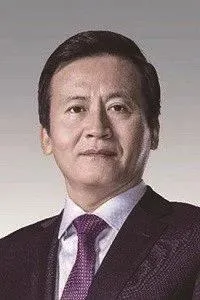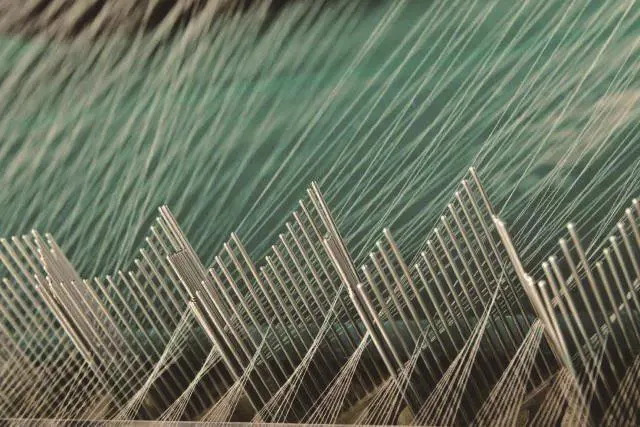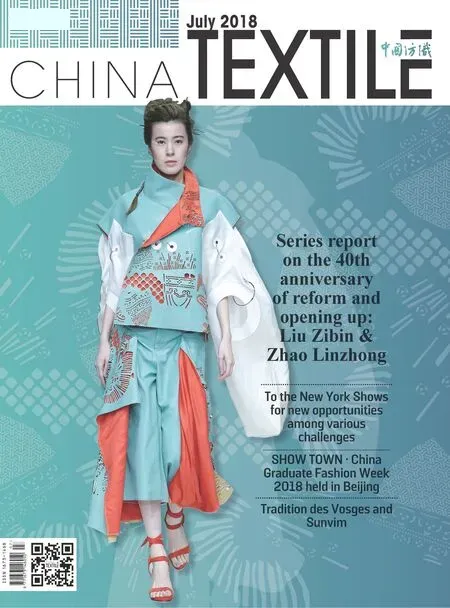Liu Zibin:We have kept the pace with the great era
Chairman and General Manager of Luthai Textile Co., Ltd.

An enterprise manifests the epitome of a country and concentrates the essence of an era.
From a small cotton mill with less than 300 employees in the past to the world’s largest manufacturer of yarn-dyed fabrics - this is Luthai Textile Co., Ltd.
If 10 years is regarded as a benchmark, in Luthai’s more than 30 years of development, the first 10 years lays a development foundation with the originality quality of its products in the first 10 years, consolidates its position in the industry with its continuous pursuit of innovation in the middle 10 years, and opens up a vast world with innovative and enterprising designs in the latest 10 years.
Luthai is a beneficiary and pioneer of reform and opening up. In the words of Liu Zibin, Chairman and General Manager of Luthai Textile Co., Ltd., “we have caught up with a great era!”
Opening up to usher in a new era with great strides
40 years of reform and opening up, and 40 years of vicissitudes and great changes. What era has made today’s Luthai?
Luthai’s predecessor was Zibo No.7 Cotton Mill,which broke ground on June 8, 1987. At the beginning of its establishment, the company was faced with difficulties such as lack of funds, backward equipment,new personnel, low technical level, low product grade and narrow market, which made its development meet difficulty in every step. No one would know that the wave of reforms underway in Shenzhen at the time would change the development path of enterprises in the future.
It is commonly believed that the rise of Shenzhen is the result of the establishment of special economic zones and the use of foreign capital. However, for a long period of time, foreign capital was China’s largest ideological burden at the beginning of reform and opening up as well as the biggest ideological obstacle.
The upsurge of foreign investment in China was after 1988, and as the blueprint for reform and opening-up was slowly unfolding, the state begun to allow foreign capital to enter China. It was precisely during this period that Luthai jointly established Luthai Textile Co., Ltd. with Thailand, which represented Shandong and Thailand, and took a key step in its development.
Against this background, Luthai was able to introduce foreign capital, advanced foreign equipment,technology and experts, draw lessons from international advanced management experience, export products and earn foreign exchange.
On March 30th, 1990, Luthai Textile Co., Ltd.was officially opened when the products were exported to Thailand, achieving the sales revenue of 22.69 million yuan, the profit of 1.68 million yuan and the export earnings of 4.48 million US dollars.
Speaking of reform and opening up, Liu Zibin sighed with emotion: “as for the 31 years of Luthai’s healthy, stable and sustainable development, we should first express thanks for being born into a great era and for the leadership of the Chinese Communist Party and its reform and opening-up policy.” He believes that without reform and opening up, there would be no continuous development and growth of Luthai. It is precisely the reform and opening-up that has brought Luthai development opportunities, pointed out the direction and injected unprecedented vitality and vigor for the development of enterprises.
Leaving the marks of reform in the course of struggle
How important is China’s reform and opening up? It can be said that it is China’s “second revolution”. And Luthai has also left the marks of struggle for industrial development through reforms one after another.

In 1993, Luthai conducted a shareholding reform;it issued B shares in 1997, A shares in 2000, and additionally issued A shares in 2008; by constantly expanding production scale, further upgrading equipment and adjusting product structure, Luthai has now reached the international leading level in terms of capacity,products and technology, etc., and become the world's largest producer of high-grade yarn-dyed fabrics and international well-known brand shirt manufacturer.
This year is the 40th anniversary of reform and opening-up, and in the new era, the whole industry’s development is presenting new characteristics and the industry's new positioning becomes increasingly clear,and Luthai is also in the active struggle for this new position.
Promote intelligent manufacturing and build innovation-driven scientific and technological enterprises. Luthai, as a global advocate and practitioner of intelligent and digital textile, carries out intelligent manufacturing to improve labor productivity, and its ultimate goal is to realize “people-oriented”; liberate people, improve labor efficiency, ultimately meet the personalized needs of customers and truly achieve“people-oriented” through the application of automation and digital equipment.
Implement brand creativity and create a cultureled fashion enterprise. For a long time, Luthai has continued to carry out technological innovations and design creations and brought new momentum to lead the trend of technology and fashion and realize the transformation and upgrading of “Luthai Manufacturing” to “Luthai Creation”.
Carry out green manufacturing and create a re-sponsibility-oriented green enterprise. As a demonstration enterprise of ecological civilization construction in the industry and a pilot enterprise of ZDHC green pioneer, Luthai is committed to building a green manufacturing system, establishing and perfecting green standards, developing green products, setting green factories, promoting the high efficiency, cleanliness,low carbonization and sustainability of manufacturing of the whole industry chain, and realizing the full life cycle management by relying on the information platform at the same time.
Liu Zibin said: “Luthai has always been dedicated to the revitalization of the textile industry as its own duty, devoted itself to realizing the dream of making the country powerful with textiles, and creating healthy, comfortable, environmentally friendly, green textiles with traceable process and reliable quality for mankind. This is also my unswerving pursuit for textiles.”
Going global, and allocating global resources to benefit the world
Over 40 years of reform and opening up, everyone’s dress, every meal on the table, every town street,has undergone a tremendous change, and China today is constantly forming a new pattern of all-round opening, releasing greater dividends to the world, and actively building the community of common destiny for all mankind.
By virtue of opening up this time, Luthai hopes to make full use of its advantages in capital, technology and professional talents, etc. to jointly build “The Belt and Road” with other countries in the world. In recent years, Luthai has steadily pushed forward the strategy of “comprehensive internationalization” and begun to go abroad, conducted international layout, become an international enterprise, and continuously enhanced its overall competitiveness.
As early as 2013, Luthai began its international layout, and successively set up offices in Milan, Italy,and established companies in the United States. Meanwhile, it invested 360 million US dollars to promote the construction of overseas production bases and became a textile and clothing group characterized by industrial chain integration, comprehensive innovation and internationalization.
At present, Luthai has built a Southeast Asian production base and established four industrial parks in Cambodia, Myanmar and Vietnam, in order to respond to national strategic deployment on the one hand, and follow the footsteps of customers and the market to get through the last mile of serving customers on the other hand.
Indeed, after China’s textile industry has entered the turning point of transformation and upgrading and stepped into the stage of high-quality development, a great many textile and clothing enterprises have begun to carry out globalization layout, most of which consider tariff, labor cost, cotton quota and other issues.However, Liu Zibin told reporters that although enterprises build factories abroad, the domestic production capacity should be increased slightly on the existing basis, and products with higher added value should be put at home, “whether in respect of investment or transfer, actually our core competitiveness still lies in talents. They are not competent for high-skilled jobs in foreign countries, so we must make use of highquality talents at home to achieve the manufacturing of products with less employment, high efficiency and differentiated production, and only this is the largest opportunity for China’s textile.”
Liu Zibin was deeply touched by the experiences of overseas investment: “these countries are just as eager for foreign investment as we were 30 years ago,while today we have entered a new stage of development. It can be seen that China’s reform and opening up has benefited not just ourselves, but the world as a whole.”
The reform has benefited the enterprise and accomplished everyone’s dream
“Luthai’s development has never been just to make money. If we don’t consider customers or employees, and never think about paying back to the local community, it’s very difficult for companies to achieve sustainable development.” Liu Zibin suggested that Just as the so-called “people who work together for common goals can succeed”, Luthai knows whom the development is for and depends on, thus creating a solid “people-oriented” corporate culture.
Luthai has more than 20,000 employees just in Zibo, Shandong, and it is said that senior and middle managers of Luthai have almost reached a zero turnover rate. In this regard, Liu Zibin bluntly stated: “no employee turnover occurs in the middle level of the company, and a very important reason why the turnover rate of employees is low is that we are peopleoriented. To be people-oriented, we need to, first of all, know what employees need. Employees wish more than to ask for a job, so we provide a platform for employees who hope to learn and get promotion further so that they can realize their personal value.”
In the course of more than 30 years of development, Luthai has established a corporate culture dominated by loving employees, vigorously practised the integration of schools and enterprises, recommended employees to go to college with pay, and besides, it has set Luthai Textile and Clothing Institute, which improves employees' knowledge and skills. Gentle breeze and mild rain nurtures every spring life spontaneously and silently. The rich and colorful cultural life makes Luthai culture take root among employees, realize the common development of employees and the enterprise, and promote the long-lasting development of Luthai.
Luthai’s mission is to “create wealth, contribute to society, get fame or money all over the whole country and devote to the country”. Over the years, Luthai has always followed the corporate mission, actively fulfilled its social responsibilities and striven to achieve harmonious economic, social and environmental development.
While pursuing its own development, Luthai has been paying close attention to the industry. In 2017,Luthai donated 3 million yuan to Textile Vision Science & Education Foundation once again, winning the high respect of the industry.
Focusing on large textile, super textile,and continuing to write a new brilliant chapter
There is no end to the reform. At present, Luthai is embarking on the journey of a new 30 years, the company proposes the development goal of “doubling its sales revenue and total profits in the next 5 to 10 years and rebuilding Luthai into a world-class wellknown enterprise”, and with the development idea of“vitalizing stock, seeking increment, strengthening industry and doing moderate operation”, the company vigorously implements the strategy of “improving quality and increasing efficiency” and “achieving comprehensive internationalization”, actively expands the industrial structure, and realizes the healthy, stable and sustainable development of the enterprise. Currently,Luthai is actively exploring the way of diversified development, focusing on “large textile”, “super textile”,based on textile and beyond textile.
Innovation-driven technology industry, responsibility-oriented green industry and culture-led fashion industry are the new positioning of China’s textile industry in the new era. Luthai in the future will constantly deepen quality change, efficiency change and power change focused on the industry positioning,achieve high-quality development with innovation drive, undertaking of responsibility and cultural guidance, and will continue to contribute to the development of the industry.
- China Textile的其它文章
- Zhao Linzhong:Witness 40 years of historical changes and narrate the course of“ideological emancipation”
- To the New York Shows for new opportunities among various challenges
- 30 years of Jigao brings benefit to a city, 20 years of Tianzhu changes an industry
- Newly increasing export earning of 100 million USD: Phase II Project of D&Y Textile (Malaysia) Sdn. Bhd. was officially put into operation
- Let intangible cultural heritage walk into the daily life
- WHAT’S NEW IN COTTON TM?COTTON USA TM invited industry professionals to an innovative cotton journey

